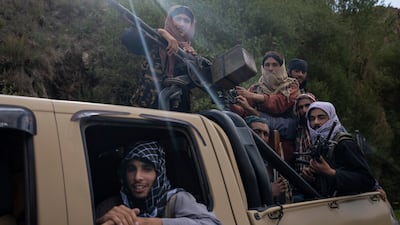It will be “nearly impossible” for the Taliban to gain recognition from the international community unless they revoke decrees curtailing women's freedoms, the top UN envoy to Afghanistan said on Wednesday.
Speaking to the Security Council, Roza Otunbayeva, the special representative of the Secretary General in Afghanistan, said the Taliban are trying to win acceptance while simultaneously enacting “punishing restrictions” on girls and women.
“In my regular discussions with the de facto authorities, I am blunt about the obstacles they have created for themselves by the decrees and restrictions they have enacted, in particular against women and girls,” she said.
“We have conveyed to them that as long as these decrees are in place, it is nearly impossible that their government will be recognised by members of the international community.”
The Taliban told UN officials in early April that no Afghan woman would be permitted to work for the world body in Afghanistan.
That same month, the Security Council unanimously adopted a resolution, led by the UAE and Japan, demanding that the Taliban “swiftly reverse” all restrictions that violate the rights of women and girls in Afghanistan.
Ms Otunbayeva stressed that the UN remains “steadfast” in its decision to not replace their female national staff with male national staff “as some de facto authorities have suggested”.
A senior UN official told The National that the Taliban feel they have done enough to earn recognition.
“So far, as we've seen, they haven't been willing to take any moves, to come towards the conditions of the international community. So we're basically in this waiting game,” he said.
The Taliban's policies, such as the ban on female NGO staff and the decree preventing Afghan women from working for the UN, have adversely affected the humanitarian response in Afghanistan.
The UAE's UN ambassador Lana Nusseibeh underscored the importance of maintaining a fully depoliticised humanitarian aid space.
“Humanitarians cannot become a political bargaining chip. We need to confirm our commitment that humanitarian actors are compartmentalised from the political dynamics of the situation in Afghanistan,” said Ms Nusseibeh.
“This is why it is more important than ever that the core humanitarian principles of neutrality, impartiality and humanity continue to drive these efforts.”
Afghanistan is facing “the most extensive humanitarian crisis worldwide”, according to the UN, and the situation has further deteriorated over the two years since the Taliban returned to power.
The number of people in need of aid rose from 28.3 million in the early part of the year to 28.8 million by the end of May.
The latest report from the Secretary General on the UN mission in Afghanistan, presented to Security Council members on Monday, said that gaining access to women in need has become increasingly challenging and noted the humanitarian community continued “to negotiate to expand authorisations”.
China's ambassador to the UN Zhang Jun underscored the need for the international community to provide more than just humanitarian aid to Afghanistan and urged “relevant countries” – especially the US – to lift unilateral sanctions on Afghanistan and return $7 billion of frozen assets.
“Until this day, not a cent has been returned into the hands of the Afghan people. We urge the US to promptly return the assets concerned the US must not delay this under various pretexts and aggravate the sufferings of the Afghan people,” he said.


